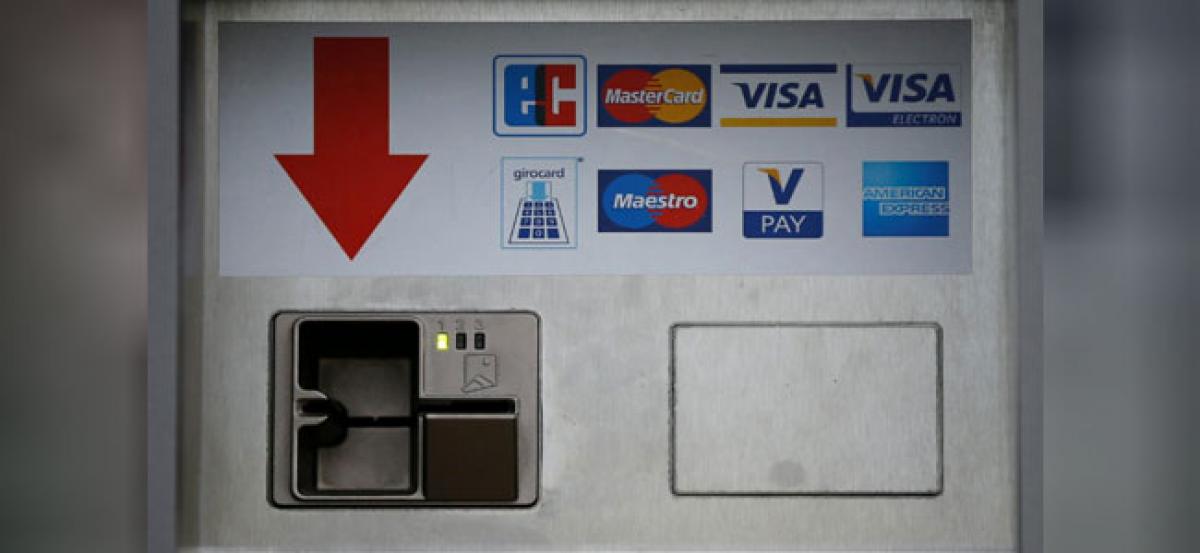Live
- Mpower’s survey on edu loans
- IIP growth falls to 3.5% in Oct
- Easing food prices lower retail inflation to 5.48% in November
- Space allocation for packaging units at MSME parks on anvil
- Maha Kumbh: Yogi reviews preparations
- Gadkari on accidents: I try to hide my face in meetings abroad
- Abetment of suicide: Mere harassment not sufficient to find accused guilty says SC
- 6.79L homes to receive water under Amrut-II
- Cops prohibit assembly of 5 or more near Group-II exam centres
- Avanthi, Grandhi quit YSRCP, lash out at Jagan
Just In

Cash no longer makes up most of the money spent in Germany, a Bundesbank study showed on Wednesday, denting a historical supremacy over other means of payments rooted in the country’s longing for privacy and freedom.
FRANKFURT : Cash no longer makes up most of the money spent in Germany, a Bundesbank study showed on Wednesday, denting a historical supremacy over other means of payments rooted in the country’s longing for privacy and freedom.
The Bundesbank has been a staunch advocate of cash in the face of a global shift to electronic forms of payments such as debit cards and an international debate about the idea of digital-only money issued by central banks.
But a survey of about 2,000 people by the German central bank showed cards were gradually gaining ground in the country, even if cash remained the favourite form of payment.
“Cash remains the most popular, but card payments are increasing,” Bundesbank board member Carl-Ludwig Thiele said as he presented the survey.
Cash accounted for 47.6 percent of German transactions by volume last year, down from 53.2 percent three years earlier and below the half mark for the first time since polling started in 2008, the survey showed.
Cards grabbed a 39.4 percent market share last year compared to 33.4 percent in 2014, mirroring a global trend that has long taken hold in many other countries including Sweden and Britain.
Internet payments also grew but still accounted for a modest 3.7 percent of total volume.
Germans and Austrians are the biggest users of cash among countries in the euro zone’s richer “core”, according to a recent study by the European Central Bank (ECB).
This preference has been associated with worries about privacy and a deeply ingrained diffidence towards the state, which some trace to the era of the Nazis and of communist East Germany.
The Bundesbank survey found most Germans thought that cash was useful to teach children about the use of money and to ensure a better control of one’s personal finances.
The vast majority also believed the abolition of notes and coins would cause problems to parts of the population, such as the elderly, while only just over a third saw it as a way to fight tax evasion and money laundering.
A German government plan to push for an upper limit of 5,000 euros to cash payments met fierce resistance two years ago, including by the country’s own central bank.
Speaking after Thiele, ECB board member Yves Mersch weighed in by saying that low caps threatened the euro’s status as the euro zone’s legal tender, which promotes freedom and equality.
The Bundesbank mounted a lonely opposition around the same time to the ECB’s move to retire the 500 euro note, its highest denomination, due to suspicions it was used by criminals. Thiele said on Wednesday he still hoped the purple bill would make a comeback when a new series of euro banknotes is unveiled.
WRONG RESPONSE
Speaking at the same conference, the Bundesbank’s president Jens Weidmann said getting rid of cash or replacing it with digital money issued by central banks would be the “wrong response” to the challenges faced by central banks at times of low inflation.
The idea of a digital currency giving holders a direct claim on the central bank is under study by Sweden’s Riksbank and has been touted by some academics as a way to extend the reach of monetary policy when interest rates on deposits are below zero.
But Weidmann rejected it and defended the use of cash and means of payments that go through commercial banks.
“(Getting rid of cash) would be the wrong, completely disproportionate response to the policy challenges of the zero lower bound,” he said.
“The same goes, obviously, for the introduction of digital central bank money with the aim of crowing out cash and enforcing negative rates across the board.”
His views were echoed by Swiss National Bank board member Fritz Zurbruegg, who told the same event the central bank had no plan to issue a digital currency.
Both argued that allowing money to be held directly at a central bank would worsen bank runs at times of trouble.
Weidmann added that it was up to central banks to promote more efficient payment systems that would quash the appetite for private digital tokens such as Bitcoin.

© 2024 Hyderabad Media House Limited/The Hans India. All rights reserved. Powered by hocalwire.com







